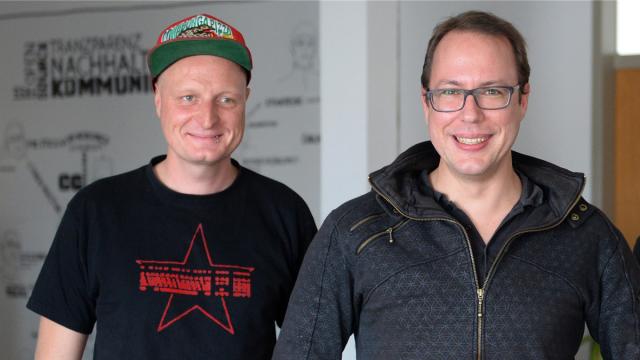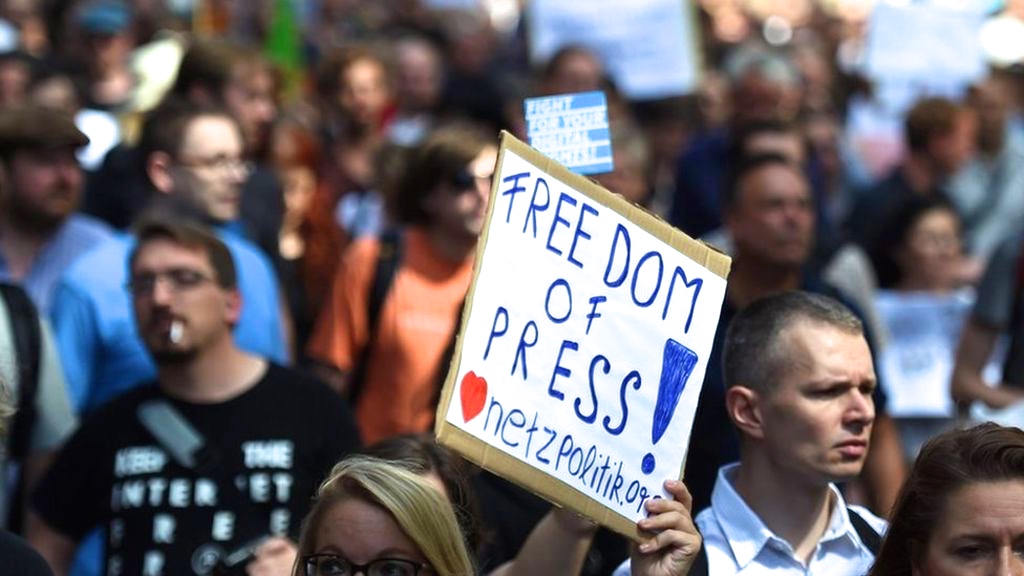
Two German journalists are demanding that authorities drop a treason probe against them in the wake of officials sacking the country's top prosecutor for his role in what has become a national scandal about privacy, government secrets and press freedom.
"There's no information about when this crappy proceeding is going to be scrapped — there is no talk of that," said Markus Beckedahl, editor-in-chief of the Netzpolitik blog, speaking this week before a packed crowd in Berlin's cyperpunk-esque hacker space, c-base.
Chief federal prosecutor Harald Range was investigating whether Beckedahl and fellow Netzpolitik journalist Andre Meister revealed state secrets when they published stories about a plan to expand Germany's online surveillance. Range was also investigating an unnamed source who allegedly leaked them confidential documents.
In two articles, the blog reported that Germany's domestic intelligence agency was seeking funds to expand its online snooping program and set up a new department to monitor social networking sites. But the case appears to have fallen into disarray after Range, the man overseeing the investigation, was put out to pasture by the government.
German Justice Minister Heiko Maas fired Range on Tuesday, saying he lost confidence in the prosecutor following the prosecutor’s role in initiating the potentially unwarranted treason investigation into Netzpolitik and the journalists' source. The investigation is now on hold, but technically has not been closed.
Justice Minister Maas said on Monday that he doubted this case involved treason. Under German law, to be found guilty of treason, prosecutors must demonstrate intent and prove the revealed state secrets would seriously harm Germany or benefit a foreign power and compromise German security. The leaked documents had the lowest possible security classification.
For the Netzpolitik journalists, however, Range's sacking is not enough.
According to Beckedahl, Range was a "sacrificial lamb" who was slated for retirement next year. "We have the feeling there's a lot more dirt here with some of those responsible than is currently known,” said Beckedahl.
“We want to know exactly who is responsible."
Range launched the probe in mid-May following a complaint by Germany's domestic intelligence agency. The justice ministry allegedly knew about the case early on, but officials claim they expressed doubts about it.
Meanwhile, the domestic intelligence agency chief, Hans-Georg Maassen, claims his initial complaints weren't directed at the Netzpolitik journalists specifically, but rather were alerting prosecutors to a potential government leak and security concern.
The ministry notified the two journalists about the probe at the end of July. They immediately blogged about it, sparking widespread criticism of Range and Maassen throughout Germany.
In recent days, thousands of Germans have taken to the streets to protest the prosecution and investigation. A legal fund to protect the journalists raised €50,000 ($54,500), and opposition parties have called for an official inquiry.
Chancellor Angela Merkel has distanced herself from Range, claiming her office found out about the probe only when it went public. Media and advocacy groups have decried the treason allegations as a direct attack on the press.
"It is really unacceptable and a serious threat to press freedom," Christian Mihr, head of the press freedom watchdog Reporters Without Borders in Germany. "I think the underlying scandal is that this is really an attempt to intimidate not only journalists, but even whistleblowers, [who] are really essential for press freedom and for an independent press."
Range continues to defend his actions, telling reporters recently that freedom of the press is valuable but not "limitless." He also labeled government requests for him to cut staff from the team conducting the probe "an intolerable encroachment on the independence of the judiciary."
But critics have accused Range of hypocrisy. He opened an investigation against the U.S. National Security Agency for allegedly tapping Chancellor Merkel's phone, but cut that probe short, citing lack of evidence.
"They weren't really free of influence…when they dropped the NSA [investigation] in Germany, saying there was a lack of proof," said Kirsten Fiedler, managing director of the NGO European Digital Rights and an occasional Netzpolitik contributor. "Now they are investigating journos who uncover violations of our right to privacy."
Press freedom is a sensitive topic in Germany owing to the country's dictatorial post. But the Netzpolitik case is not the first time post-Nazi Germany has gone after journalists on treason charges.
In 1962, reporters at the weekly magazine Der Spiegel were apprehended on charges of high treason for publishing an article about West Germany's defense forces. The major scandal that ensued cost then-Defense Minister Franz Josef Strauss his job.
German prosecutors are more likely today to use copyright law to crack down on errant journalists. Last year, the country's interior ministry took public watchdog website Frag den Staat, or Ask the State, to court for violating copyright by publishing an internal ministry report. The court ruled against the ministry.
But that decision didn’t dampen officials' zeal to litigate. Germany's third-largest newspaper and magazine publisher, Funke Mediengruppe, is embroiled in a court battle with the defense ministry for publishing documents concerning the German army's mission in Afghanistan. The media group violated copyright law, the ministry claims.
"Germany, which always holds up press freedom so highly, when it comes to protection of sources, is more like a developing country," said Beckedahl.
"I never would have thought I lived in a country where I could theoretically be under surveillance and I could go to jail for my work. I don't want such a thing to be possible and I don't want that to be possible in a country where press freedom is valued."
3 WAYS TO SHOW YOUR SUPPORT
- Log in to post comments













